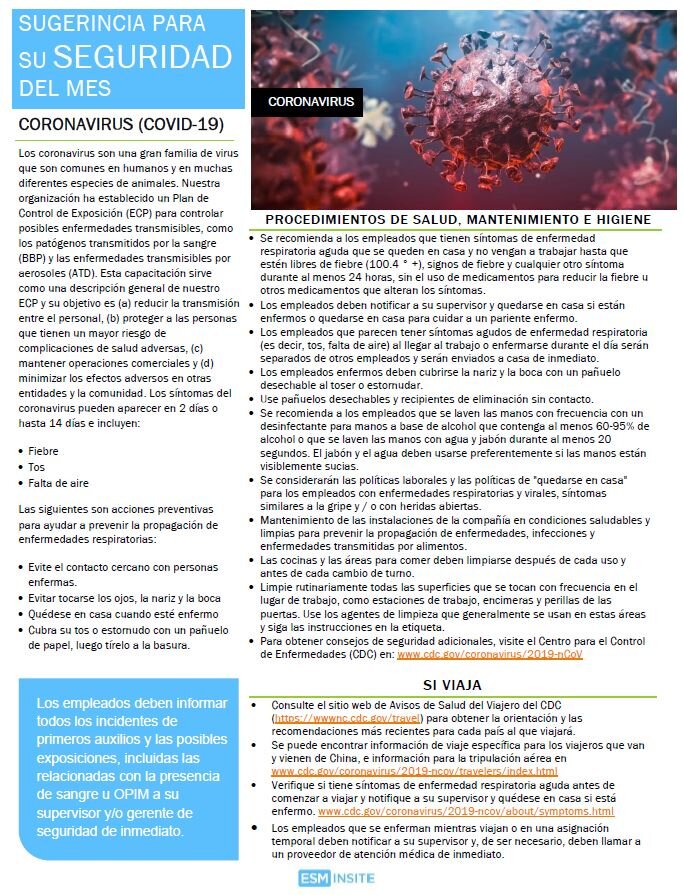Exposure Control Plan: Coronavirus (COVID-19)
As the threat of the Coronavirus continues to expand globally, it is important that employers develop an exposure control and response plan as well as provide training to impacted employees. To help, ESM has developed training tools for employers to use as a framework from which to mitigate the exposure. Communicable Diseases are infectious diseases such as Blood Borne Pathogens (BBP), that spread through contact with blood and other potentially infectious materials. Other CD’s, such as Aerosol Transmissible Diseases (ATD) are spread through respiratory secretions when exhaled or expelled through coughing, sneezing, etc., and other infectious diseases which are spread through body contact, contact with infected body fluids, or through other vectors and means.
To assist employers with managing this exposure ESM has developed the following, which you will find below.
Exposure Control Plan Overview
Exposure Control Plan Policy
Coronavirus training (in English & Spanish)
Work From Home Wellness Training
Work Comp Decision Tree
Additionally, employers should review the following company policies and modify them as needed during potential outbreak exposures:
Bloodborne Pathogens Program
Work from home policy - consider a flexible schedule
PTO / Sick time
Travel policy, especially for international travel and conferences
Click on the tools below to download each.
(Scroll further for a Q&A on the compensability of a Coronavirus Workers’ Compensation claim.)
Exposure Control Plan Recorded (Video)
Coronvavirus Q&A
Q. Is Coronavirus covered under Workers’ Compensation?
A. For a claim to be compensable under Workers’ Compensation it must satisfy a 2-prong test of AOE/COE. It must Arise Out of Employment and occur in the Course Of Employment. So, the answer could be yes or no, and would be determined on a case by case basis. For example, a Health Care Worker who is caring for patients with the disease and contracts the disease, it could be considered compensable.
Q. How is it different than just catching a cold or flu?
A. That is a good question, and one that should be asked. If the sick person was not exposed to any greater danger at their place of work than the general public, then it would not likely be compensable. There is a 14-day incubation period for the Coronavirus, so pinpointing exactly when and where a person contracted the disease may be difficult.
The Coronavirus can affect the entire world population so there would have to be something “peculiar” to an occupation for the disease to be compensable. (For example, black lung disease among miners; hepatitis among health care workers.)
Q. What if my employee says she has contracted Coronavirus, and she wants to file a claim?
A. An employee can allege an injury or illness that must then be investigated, and the facts of the case will determine acceptance or denial. In California, that determination must be made within 90 days of the employer’s knowledge of the claim. Therefore, report the alleged claim immediately and ask your carrier or TPA to “delay and investigate.”
Q. What if my employee contracts Coronavirus, then transmits it to his family. Are the family members covered?
A. Workers’ Compensation is a no-fault system that covers employees for injury or illness that is work related.
The first step is to investigate the circumstances to determine if the employee’s illness is compensable under the 2-prong test of AOE/COE. (Arising Out of Employment and in the Course Of Employment.)
If an employee files a claim for Coronavirus, submit it immediately to your insurance carrier and closely manage the adjuster’s investigation to ensure thorough discovery and analysis. The deadline for denial is 90 days from the employer’s knowledge. If the carrier does not deny the claim by the 90th day, it is presumed compensable.
The standard Workers’ Comp policy also includes a provision for Employers’ Liability (usually with a $1 million limit). While it is rare, there could be coverage under this section of the Policy, if the employee’s illness is found to be compensable.
It is uncommon to find coverage in this section of the W.C. Policy, however, the COVID-19 is an uncommon exposures.
Four major types of claims that are covered under the Employers’ Liability section of the Workers’ Compensation policy.
Third Party over Action. This is a lawsuit that is filed by a third party who is seeking indemnity because it was held liable for an employee injury.
Loss of Consortium. This is a lawsuit filed by an injured employee’s spouse for loss of services of the spouse who was injured.
Dual Capacity Suits. These are brought by an injured employee against the employer when injury arises from a product the employee manufactures.
Consequential Bodily Injury. These lawsuits are filed by a family member for injuries that are caused by that family member as a consequence of the employee’s injury.
For additional information, please contact us at info@esminsite.com
Additional Resources
Centers for Disease Control & Prevention (CDC): Coronavirus Overview
CDC: Coronavirus Disease Situation Summary
CDC: Travel Summary and Risk Assessment by geographic area
World Health Organization: Coronavirus Situation Report
Cal-OSHA Bloodborne Pathogens Standard (T8CCR5193)






